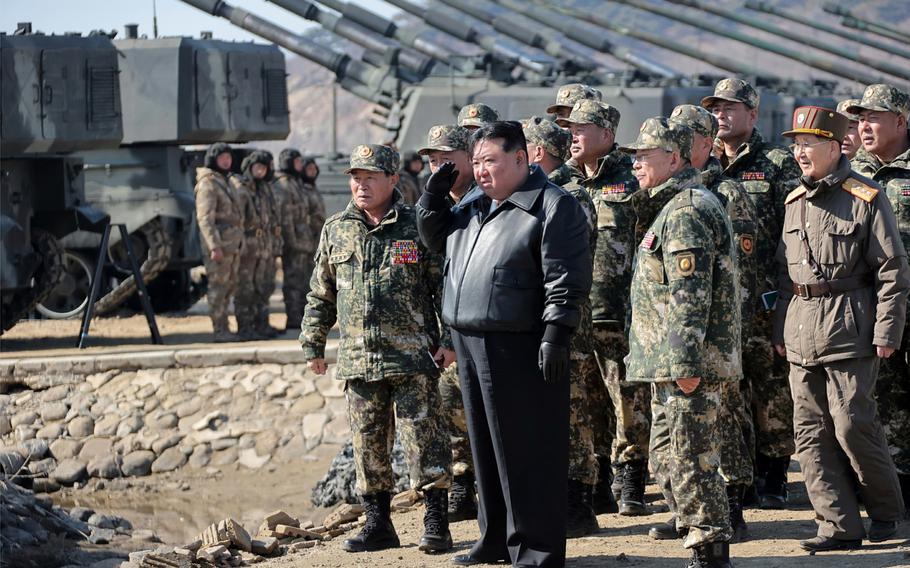
North Korean leader Kim Jong Un observes marksmanship training, March 6, 2024, in this image from the state-run Korean Central News Agency. (KCNA)
CAMP HUMPHREYS, South Korea — North Korea carried out a rare intercontinental ballistic missile launch on Thursday, just hours after Defense Secretary Lloyd Austin and his South Korean counterpart condemned Pyongyang for supplying troops to Russia for its war against Ukraine.
The ICBM – the first fired by the North since Dec. 18 – lofted eastward from the Pyongyang area at 7:10 a.m., South Korea’s Joint Chiefs of Staff said in a message to reporters that morning.
North Korean leader Kim Jong Un was present at the launch site and described the launch as an “appropriate military action” in response to unnamed “rivals” who “intentionally intensified the regional situation,” according to a report Thursday by the state-run Korean Central News Agency on Thursday.
Kim typically means the U.S., South Korea and Japan when he refers to rivals, whose actions he said underscore “the importance of strengthening our nuclear forces,” according to KCNA.
The ICBM appeared to surpass previous North Korean rockets for altitude reached, Japanese Defense Minister Gen Nakatani said at a televised news conference in Tokyo.
The missile apparently traveled about 620 miles and reached a maximum altitude of more than 4,350 miles, he said, adding that the ICBM’s flight details are being analyzed by Japan, United States and South Korea.
The launch came several hours after Austin and South Korean Minister of National Defense Kim Yong Hyun denounced North Korea’s deployment of approximately 10,000 troops in support of Russia’s invasion of Ukraine.
There is a “pretty high” likelihood that those troops will be seeing combat toward the Ukrainian border, Austin said during Wednesday’s joint press conference at the Pentagon.
The South Korean minister said he does not yet believe the presence of North Korean troops in Russia increases the chance of war on the Korean Peninsula, but it could “result in the escalation of the security threats” there.
“This is because there is a high possibility that North Korea, in exchange for their troops’ deployment, would ask for cutting-edge technology” from Russia, Kim Yong Hyun said in translated remarks. “There is a high chance that … North Korea is very likely to ask for technology transfers in diverse areas.”
The missile traveled about 86 minutes and fell at 8:37 a.m. into the Sea of Japan, also known as the East Sea, about 125 miles west of Okushiri Island, outside of Japan’s Exclusive Economic Zone, the Japanese defense minister said.
No damage to ships or aircraft downrange of the launch was reported, Nakatani added.
Kim Jong Un and Russian President Vladimir Putin pledged during a June summit in Pyongyang to provide mutual military assistance if either were attacked.
South Korean President Yoon Suk Yeol described the North Korea-Russia military cooperation as a significant escalation in the Ukraine war and said his office is reviewing its stance on sending only nonlethal aid to Kyiv.
North Korea did not confirm or deny deploying troops to Russia but said the notion complies with “international law and norms,” according to an Oct. 25 report by KCNA.
The communist regime has launched more than 40 ballistic missiles so far this year. It last fired a short-range ballistic missile and a cruise missile on Sept. 18.
The ICBM launched in December flew eastward approximately 620 miles before splashing down in the Sea of Japan, the South’s military said at the time.